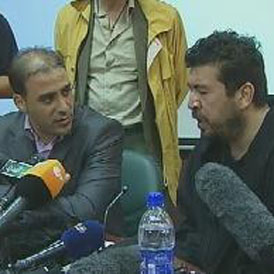British-Libyan detained by Gaddafi
The wife of a British man accused by the Gaddafi regime of belonging to a banned Islamist militant group says he was only in Libya to visit relatives. Jonathan Miller hears his testimony.

The Foreign Office says it is making urgent inquiries about the safety of Salah Mohammed Ali Aboaoba – a married man with four children living in Manchester – who has been detained by Libyan authorities on charges of sedition.
Jonathan Miller, who is working as a member of the foreign press corps in Tripoli, was taken by media minders to the National Department for Criminal Investigation, where he was told he would meet an al Qaeda-linked militant, arrested in the western town of Zawiyah, which was recaptured by the regime from rebel forces last week.
Salah Aboaoba told him he was speaking of his own free will and said he had joined the banned Libyan Islamic Fighting Group (LIFG) in Yemen 14 years ago. The LIFG has been banned in Britain since 2005 as a terrorist organisation.
“From Yemen I went to Britain. I stayed there in Britain until 2010,” he said. “I do indeed have British nationality. I am British. I was not involved in any terrorist activities in Britain, apart from my funding of the Libyan Islamic Fighting Group.”
Mr Aboaoba said he’d been granted asylum in Britain and settled in Manchester with his family, where he raised funds for the jihadist group at Manchester’s Didsbury mosque. A spokesman for the mosque vehemently denied this. In a statement to Channel 4 News, he said: “This is the first time I’ve heard of the LIFG. I do not know Salah.
I do indeed have British nationality. I am British. I was not involved in any terrorist activities in Britain, apart from my funding of the Libyan Islamic Fighting Group Salah Mohammed Ali Aboaoba, who is being held in Libya
No funds have ever been raised for the group at the mosque. The only money raised has been for the running of the mosque or for international disaster campaigns like the famine in Somalia and Kenya.” Mr Aboaoba said that some of the funds had been destined from Zawiyah – his home town – where he’d returned just as the battle between rebels and Gaddafi forces had begun. He claimed that he had managed opposition logistics: medicine, maps, food and smuggling rebels into the town.
Picked up on Sunday 6 March in the main square in Zawiyah, he allegedly told the authorities that he was “already having misgivings because of the violent nature of the uprising”, so now he is “co-operating” with the Gaddafi regime. But family and friends of Mr Aboaoba back in Manchester tell a different story. His wife, Ebitsam Salah, told Channel 4 News that he had arrived in Britain in 1998 after being shot in the leg in Libya.
He had been granted British citizenship in 2002. He had gone to Egypt to see his family on 20 February, but when they did not appear he went to Zawiyah to find them, she said. She had not heard from him since then and had no idea of him having any links with the LIFG. “I have no idea – no idea about that. If it was true then it is all with him, he never told anybody,” she added.
“I am shocked for this news. I never thought he’d be in this situation, because he didn’t tell us – we haven’t heard from him – I didn’t know he’d been captured or ever imagined it would happen to him.” A family friend, Hadi Saeed, denied that Mr Aboaoba was a member of the LIFG. “I can assure you he has nothing to do with any specific groups – although he’s Islamic, we’re all Islamic in our religion, but he would not be part of any specific group,” he said.
“I’ve never known him to be. I think he must have been under some sort of pressure to say this – even if he was part of a group he wouldn’t say that.”
A Foreign Office spokesman told Channel 4 News: “We are aware of the detention of a dual British-Libyan national in Libya. We are in contact with their family and are providing consular assistance.
“We have been in touch with the Turkish Embassy, which is representing the UK on consular issues in Libya, asking them to urgently raise this issue with the Libyan authorities. We will monitor developments closely to ensure that we take all appropriate action.